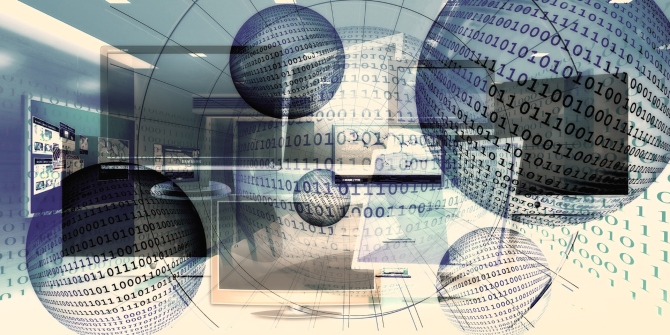 While the 2003 World Summit on the Information Society (WSIS) in Geneva paid special attention to the needs of developing countries to meaningfully participate in debates about Internet governance, the participation of African countries in these debates – and in particular in the WSIS processes that have taken place since 2003 – has been more limited. In the third of a series of posts on the WSIS+10 process edited by LSE alumna Anri van der Spuy, Enrico Calandro, Senior Research Fellow at Research ICT Africa, highlights some of his organisation’s findings about multistakeholder participation from an African perspective.
While the 2003 World Summit on the Information Society (WSIS) in Geneva paid special attention to the needs of developing countries to meaningfully participate in debates about Internet governance, the participation of African countries in these debates – and in particular in the WSIS processes that have taken place since 2003 – has been more limited. In the third of a series of posts on the WSIS+10 process edited by LSE alumna Anri van der Spuy, Enrico Calandro, Senior Research Fellow at Research ICT Africa, highlights some of his organisation’s findings about multistakeholder participation from an African perspective.
Where is Africa in the debate?
Over the last ten years, a variety of institutions and organisations have emerged as players in discussions related to Internet governance in Africa. These so-called ‘Af*’ institutions, together with African, regional and national Internet Governance Forums (IGFs) as well as other organisations, networks and forums, have embraced the model of multistakeholder participation in Internet governance, with each playing a role in the technical and political governance of Africa’s Internet ecosystem. Nevertheless, ever since the inception of WSIS in 2003, there has been an understanding that more needs to be done to encourage a greater number of African countries to participate in global Internet governance debates – and to improve the quality of that participation. As such, a call for action was included in the Tunis Agenda, paragraph 72.f which states that the mandate of the IGF is to “strengthen and enhance the engagement of stakeholders in existing and/or future Internet governance mechanisms, particularly those from developing countries”.
This week, the WSIS+10 High-Level Review Meeting of the UN General Assembly is expected to discuss a number of challenges related to working with multiple stakeholders in implementing the WSIS Action Lines. These challenges include the limited and insufficient role played by both the private sector and civil society organisations, a concern acknowledged by the Regional Review Meeting on “WSIS+10 and Beyond: Outcomes and Perspectives for Africa”, organised by the UN Economic Commission for Africa in April 2015. In advance of the WSIS process, UN Member States and other stakeholders were asked to participate in the WSIS+10 discussions, submitting comments about progress made on the original WSIS outcomes, to inform a final outcome document to be adopted by the UN this week.
From Africa, only Cape Verde, Mauritius, Seychelles, São Tomé & Príncipe (represented by the Alliance of Small Islands States), Egypt, Tunisia and Kenya submitted their comments. All the submissions from African governments acknowledged that developing countries are not participating in global decision-making processes about Internet governance. Specifically, the submissions contended that geo-political and historical injustices along economic, social, political and cultural lines first need to be resolved in order to create a level playing field for public policy development within WSIS.
Influencing decision-making processes
Research ICT Africa’s studies found that least-developed countries (LDCs) – which seldom participate in any Internet governance forums – appear to be far more comfortable participating in national sovereign state membership-based organisations such as the International Telecommunications Union (ITU). This is true not only for governing the technological and operational aspects of global electronic networks, but also in terms of regulating issues such as cyber-security. This can partly be explained by the fact that, compared to other global Internet governance bodies such as Internet Corporation for Assigned Names and Numbers (ICANN) and the IGF, the ITU provides technical support to these countries, both in terms of capacity-building and of ICT regulatory technical assistance. Furthermore, while many African members remain largely silent in agenda-setting at the IGF and the ICANN level, they are able to influence outcomes by voting en bloc as the African Caucus in ITU meetings.
When examining which institutions are involved in African Internet governance, one should not underestimate the role played by voluntary private initiatives, particularly in terms of helping governments develop resources and expertise. One such organisation is the African Regional Internet Registry, AfriNIC, which has been prominent in the technical governance of the Internet since 2005, both in the management of internet protocol (IP) numbers and addresses and in the provision of training for engineers and network operators. Governments participate in AfriNIC through the AfriNIC Government Working Group (AfGWG), with levels of participation varying according to the capacity and circumstances of each government. However, in general, government participation in AfriNIC is poor due to the technical nature of these meetings, which excludes many who do not have the required specialist background or skills to participate. African governments’ preferred body for the governance of the Internet therefore seems to be the ITU, where they have veto power. A lack of funds to participate in AfriNIC meetings is also a disincentivising factor.
Context is key
Our studies found that reasons for limited African participation in Internet governance forums are complex and need to be understood within the Internet ecosystem specific to Africa. From the continent’s perspective, the Internet landscape is characterised by high prices for internet access, low levels of usage, poor quality of broadband services, and a dearth of relevant, locally-produced content in languages people can understand. In short, low levels of competition, limited institutional capacity to provide effective regulatory oversight and, in some instances, political interference and corruption in regulatory practices, have resulted in a restrictive investment environment and little Internet diffusion.
Although the current decentralised, community-led and voluntary model of governance has been recognised as one reason for the Internet expanding globally, the assumptions of good governance, openness and freedom underlying this model do not fully apply to African countries. Therefore, from an Internet governance perspective, the potential of the Internet to contribute to economic growth, development and innovation has not been fully harnessed in Africa.
Looking ahead
In the WSIS+10 negotiations, we expect that the discussions will reflect more commitment from Africa to achieve a higher level of participation amongst African stakeholders in future meetings about Internet governance. This could be done in a number of ways: by strengthening research capacity on Internet governance in Africa to identify evidence-based points of policy intervention; by devising innovative mechanisms for remote participation; by reviewing the temporal sequencing of Internet governance processes in order to link national, regional, continent-level and global forums “by design”; and by developing a strong Internet governance leadership to achieve better coordination between stakeholders.
This blog gives the views of the author and does not represent the position of the LSE Media Policy Project blog, nor of the London School of Economics and Political Science.





